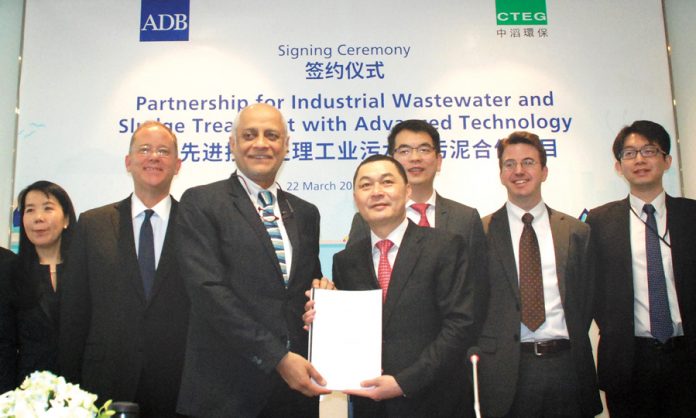The Asian Development Bank (ADB) has signed a loan of US$250 million to support China’s drive to treat harmful industrial wastewater and sludge generated by small and medium-sized enterprises (SMEs). The assistance is going to CT Environmental Group, a leader in wastewater and sludge treatment for SMEs in various industrial sectors in China.
“SMEs are vital to the China’s economic growth and employment, but they contribute significantly to the country’s water pollution as those in the most water-intensive sectors—such as textiles, pulp and paper, food processing, and chemicals—discharge significant amounts of wastewater into the water system,” Hisaka Kimura, Head of Private Sector Infrastructure Finance at ADB’s East Asia Unit, told The Source. “Without proper mitigation, such pollution poses direct harm to water supply, aquatic life, and public health.”
SMEs contribute close to two-thirds of the China’s gross domestic product. However, they also account for a large amount of water pollution, with sludge in particular having a serious impact on soil and groundwater quality given its high level of toxicity. While larger companies typically have their own treatment facilities, smaller enterprises need solutions that go beyond traditional municipal wastewater treatment.
The loan will be used by CT Environmental Group to build, own, and operate a series of specialised industrial wastewater and sludge treatment plants in designated areas, which will be determined by local governments.
Treated wastewater, which meets national environmental standards, will either be discharged, or supplied back to industrial customers for reuse. The goal is to build sufficent capacity to treat 450,000 tonnes of wastewater and 4,200 tonnes of sludge per day by 2019.
“CT Environmental Group’s business model is to develop and operate centralised wastewater treatment across a number of factories in a single industrial park,” said Kimura. “Compared to on-site wastewater treatment facilities dedicated to a single factory, the model of centralised treatment services is more cost-efficient, allowing SMEs to be more competitive and achieve better environmental results, since the treatment is handled by a specialised operator with relevant technical expertise.”









